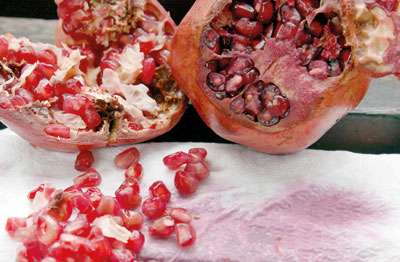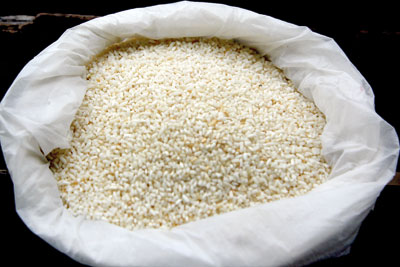News
Tainted food, fruit, veggies, and cooking oil galore
Thousands of cases of food unfit for human consumption are being detected every year in Sri Lanka, food safety officials say.

Pomegranate oozing not with goodness but colouring
“From an estimated 20,000 cases a year, about 25% relate to food items which are not fit for consumption,’’ the deputy director general of environmental, occupational health and food safety, Dr Lakshman Gamlath said.
The numbers would be higher if only detections could be increased. But there are not enough public health inspectors.
Checks have found adulteration by unapproved flavours, preservatives and colouring and adding of organic substitutes to food.
Even ingredients are adulterated and so are cooked meals, fruit, vegetables, grain, and spices.
Dr Gamlath said that the most adulterated substance is cooking oil.
Palm oil and soya oil are imported from Malaysia and sold as coconut oil as well as olive oil, he revealed.
“There is no special oil known as vegetable oil, but instead palm oil is being sold,’’ he said.
Worse, restaurants and canteens are recycling used cooking oil.
Wheat powder is added to spices and curry powder, and further tainted with banned colouring and flavours.
Fishermen are continuing to inject formalin to prevent fish from rotting, he said.
Dr Gamlath said dried fish infected with fungi are being sold.
He said that the Food Act is being amended to increase fines. New regulations will require food and beverage factories and restaurants to register.
Organisations campaigning for consumer rights alleged that the PHIs, Health Ministry officials as well as the Consumer Affairs Authority are slow to act against food adulteration.

National organiser of the Restaurant Owners Union, Asela Sampath
The national organiser of the Restaurant Owners Union, Asela Sampath, said that food adulteration will continue because of the lack of inspections and severe punishments.
He noted that colouring is added to vegetables, while banned chemicals are used to speed up the ripening of food.
Mr Sampath also claimed that he detected some unusually reddish pomegranate (delum) in the market near the National Hospital in Colombo. He suspects that colouring has been added.
He said tea leaves are mixed with used tea from tea bags and colouring is added.
Also, restaurants use milk powder nearing the expiry date.
Mr Sampath pointed out that colouring is added to red rice, while rice meant for use as animal feed is sold as broken rice. He claimed that even tomato sauce is mixed with binding gum to increase volume.
National Moment for Consumer Rights Protection Chairman, Ranjith Withanage said that food preservatives and chemicals are added to vegetables at least in four stages before being sold.
“The farmer uses chemical fertiliser and pesticides while the transporter uses another variant of chemical. Both wholesalers and retailers use preservatives and chemicals to ripen fruit,” he said.
He said restaurants sell stale food by seasoning them with monosodium glutamate.
The Public Health Inspectors Union, secretary, Siripala Kapipearachchi said when chemicals are added, it is difficult to detect.
Samples taken during raids are sent to Health Ministry laboratories and Government Analyst.
Mr Kapipearachchi, said while action has to be taken within three months, lab reports are not available in that time frame.
He admitted there is a shortage of PHIs. They have to cover 15,000 people while normally they have to oversee 9,000 people.

Unfit for human consumption: Rice mixed with animal feed. Pix by Priyantha Wickramaarachchi
“The Food Act should be amended and fines against food adulteration must be increased. We can not allow the perpetrators to get away by paying fines of Rs 3,000 to Rs 10,000” he said.
The chairman of the Consumer Affairs Authority, Hasitha Thilakaratne, said tainted cooking oil was detected a week ago in the Fort.
“We also detected how used oil is re-packed and sold.’’ One one occasion officers found oil stored in barrels marked, “poison’’.
He added that oil discarded from restaurants are re-bottled after being bleached.
Mr Thilakaratne said that according to a gazette notice, coconut oil can only be distributed after displaying the expiry date, distributor’s name and manufacturing date.
He pointed out that mixed oil products can be sold with a composition of 70:30 ratio. The names of the mixing agents also should be visible.

